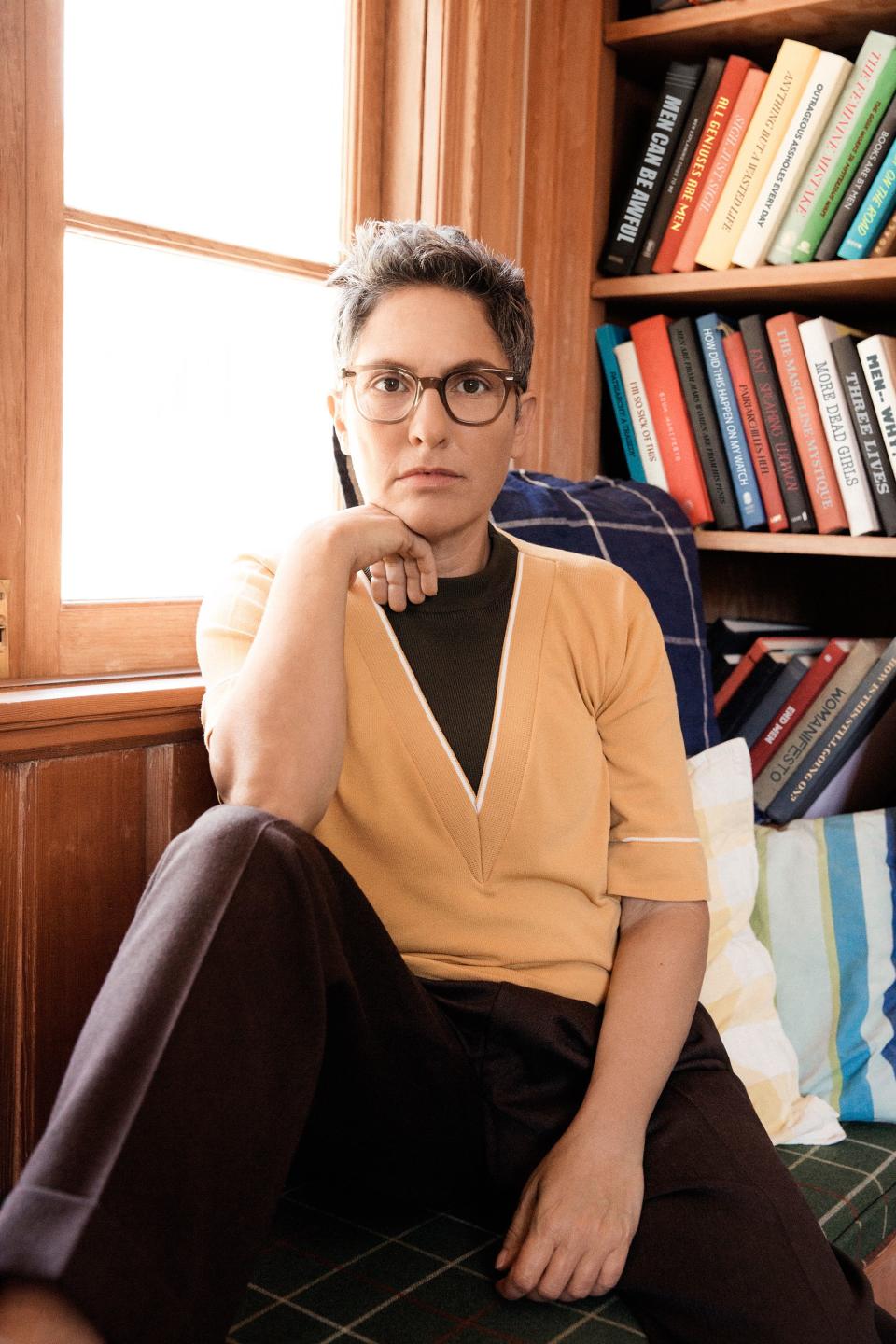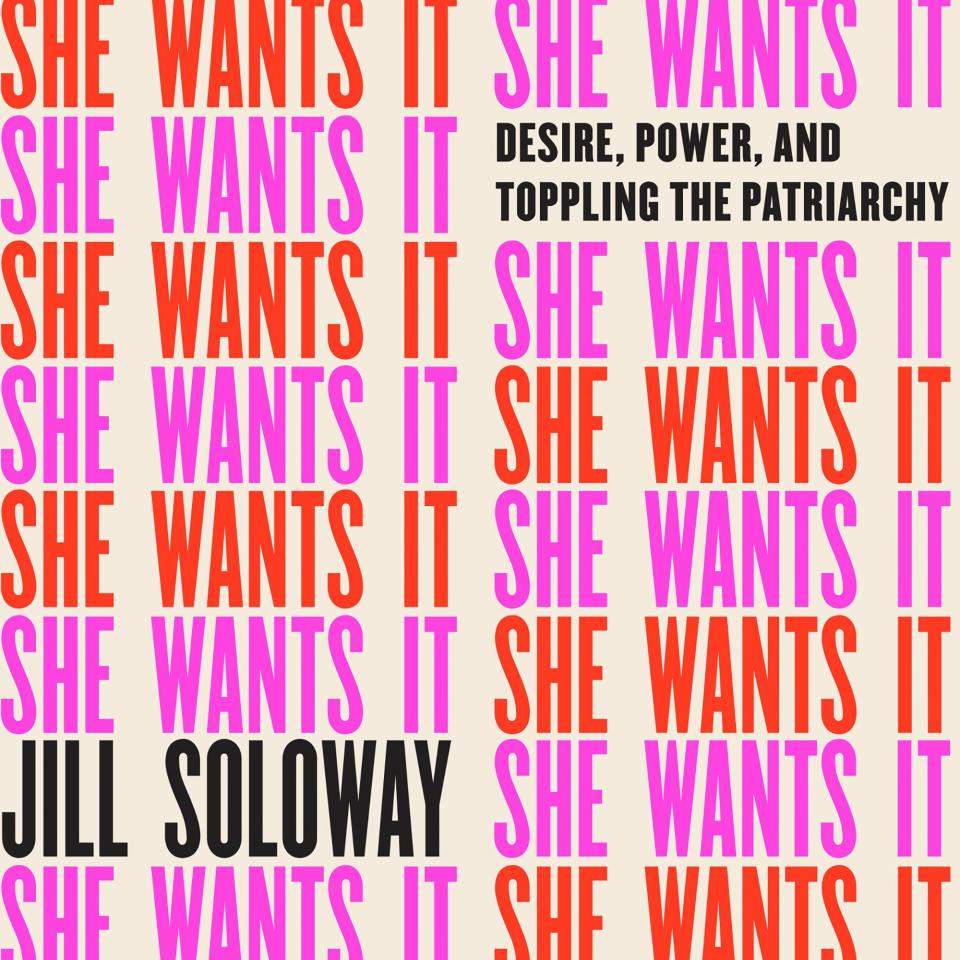Jill Soloway on the Emotional Labor of the Female Showrunner
When Jill Soloway won the Emmy for Outstanding Directing for a Comedy Series in 2016, she ended her acceptance speech with an invocation. “Topple the patriarchy,” she shouted, and then repeated herself. When Trump won, she recently told me, she wanted to change the name of her new book to Topple the Patriarchy Right Now. Her new book, She Wants It: Desire, Power, and—yes—Toppling the Patriarchy, is full of that kind of urgency, but what’s so compelling about it is that she applies that urgency to many different parts of her life: discovering her art, discovering what (and who) she really loved.
This book doesn’t need to be one thing, but if you were to give it a genre, what would you call it? A love story? A coming-of-age story (for someone in their 40s)? Something else?
It’s sort of a letter to a best friend, or even a journal entry that I’m using as a flashlight to tunnel through my past. I guess when I was writing, I thought of it as a braid. It was my personal gender story and a behind-the-scenes showbiz dish, as well as a call to arms for the current reckoning and revolution. But I recently saw that a reviewer called it a cri de coeur and I loved that! Then, of course, I looked up cri de coeur to be sure I actually loved it and saw that it meant a passionate appeal, complaint, or protest. I guess the passionate appeal tag works because it means that telling my story—about both becoming and undoing, moving from “I want” to “I am”—might be inspiring or galvanizing for others.

People who’ve watched Transparent will know that the children refer to Maura, the character played by Jeffrey Tambor, as “Moppa.” I was surprised to learn that this made it into your scripts before you started using it for your own trans parent. People talk about life imitating art, but this seems like your art was in some ways practice for your life. Were there any other instances in which you felt like your art got ahead of your life?
Over the first few years of the show, it felt like I was writing things as a way to experience them before I experienced them in real life. I wrote episodes and storylines that were like test balloons for reality. I didn’t think of it that way when I was doing it, of course. I think a lot of artists, when they feel like the art is just “coming out in a fast, natural flow”—are actually putting words or images to their unconscious desires for the very first time. When I look back, I can see that the writing of Ali falling in love with Leslie Mackinaw was like a trial run for me falling in love with Eileen Myles. Because there were often a few months between the germination of an idea and the filming, often it would seem like the “real” event happened smack in between writing it and shooting it. It was definitely weird.
In the book you write about how Transparent was taking off as your marriage was coming apart. Can you talk a little bit about the way you’ve handled the simultaneous unfolding of success and disappointment in various spheres of your life?
A bunch of my friends have told me that this is very common. At the same time, you have your peak life moments, you also have your biggest tragedies. Does one cause the other? Does the work you need to do to have a big success necessarily undo other parts of your life? Does the Godx just work in mysterious and devious ways, taking with one hand while giving with the other? Does the Godx even have hands? These are the kinds of things that keep me up at night. I say “Godx,” because I used to say “Thank Goddess” and “God is a woman,” et cetera, but I’ve recently gotten to thinking—why wouldn’t God be nonbinary?

Jeffrey Tambor in Transparent
You built a nontraditional writers room to create Transparent—bringing in people who had never written for TV, and, importantly, in the second season, a writer who is transgender. Can you tell us what kind of thinking goes into your selection process? What are you looking for in a writer for one of your shows?
Writing for a TV family or cast of characters is really about channeling souls. As a leader, I don’t come in with strong imperatives like “this must happen” or “that must happen.” Rather, we all gather and think and talk about the people as if they are real. I learned that from Alan Ball when he was running Six Feet Under. So it’s the same question with any writers’ room I put together—what will be the best way to conjure up vigorous and meaningful storylines, aka bring in the magic? I like to pick people who are fun to hang out with. So like a terrific dinner party or a dream improv team, the writers’ room has to have chemistry and comedy and community.
You write in the book: “The set was often influenced by a weather system known as Jeffrey’s possible moods. He was a package of raw nerves threatening to unravel in pain and anger. This is what made him such a beautiful actor to watch. . . . Sometimes I would get calls from the set. You better get here. Jeffrey needs you. It was like being a mom. Or a daughter whose life depended on stopping Dad from raging.” Obviously, a lot has been written about the way Tambor behaved during the filming of the show, but I’m curious about your interaction with him before his behavior became public. It seems at this point that you had shuffled off some of the more onerous aspects of the traditional caretaking roles (wife, mother), or at least attempted to define them according to your own terms. But in your professional life, it seems that you were fulfilling them more than ever. Can you talk about the way this emotional labor played out for you?
I’m so glad you are calling this emotional labor because that’s a phrase that describes what so many women add to their daily plate—but it never really gets named. Just having the language for something gives us the chance to see it, and then to understand it. So—leadership. Emotional labor and leadership. In many ways, being the boss or even being the showrunner or a director is kind of a parental thing, that’s natural—but what kind of parent? Do you want to be a dad who expects courage and big things, with a coach-like withholding attitude? Arms folded, baseball cap on? Or do you want to be a mom who says, “I gotcha, we got this, you can’t make a mistake, I’m on your side”? I know those are really kind of gender-essentialist descriptions, so I use them here with a little bit of a wink. But as someone who was always talking about “the feminine,” it felt natural for me to let the folks I worked with know that they were unconditionally supported. The reckoning, of the past year, I suppose, provided us all with some new conditions. Unconditional love is for your home, for your family. But the mood of the workplace is changing. Everyone needs to be more careful. And it’s my job as a boss to be more specific and even demanding when it comes to expectations of how people treat one another.
I read this book even before the galleys were out, which felt very close (in time) to the period in which descriptions of Tambor’s behavior became public. Is there anything that you felt you wanted to add, even after the book was completed?
So, I started writing the book about four years ago and was very close to having it completed a couple years back. When Trump got elected, though, I was so angry, I wanted to change the name of the book to Topple the Patriarchy Right Now, or some other really fiery demand. Also, after Trump was elected, I started to lose faith in my purpose. What was the point of making all of this feminist art if we hadn’t been able to catalyze any of it into real change? I was also looking at the final edit and trying to figure out what my constant haranguing about consent had to do with my storytelling. When the reckoning happened—not only on our set but all across this industry and country—I realized I could bring a sense of understanding into the end of the book. I rewrote the last two chapters in the spring of 2018 and was right up against the deadline as I worked. This month, heading out into my book tour amid the Kavanaugh hearings and so much talk about patriarchy—how men corroborate one another’s realities—and the boundaries women can and can’t uphold with their bodies has reinforced my zeal to bring the conversations in the last part of the book into live venues.
I love the way you bring different artistic influences into this book—from Lydia Davis to Louise Bourgeois. What are you reading and loving right now? What was the last film or TV show that made you cry or laugh out loud? Or what was the last work of art that captivated you?
Well, in terms of visual art, these days I am loving the painters Christina Quarles, Rebecca Morgan, and Iva Gueorguieva, re-diving back into the histories of Louise Bourgeois and Claude Cahun. Books-wise, I can’t wait to read Abbi Jacobson’s book, and I’m a huge fan of Vivek Shraya, Masha Gessen, Rebecca Traister, Samantha Irby, and Ali Liebegott. I am chomping at the bit to see my hero Kathryn Hahn in Private Life.


